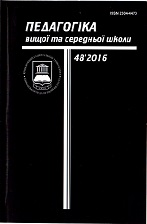The main ternds and features of professional training of teachers of German in Ukraine
DOI:
https://doi.org/10.31812/educdim.v48i0.2389Keywords:
foreign language, cross-cultural competence, lifelong learning, innovative features of teaching and educational process at school, university cooperationAbstract
Dzewizka L. S. The main ternds and features of professional training of teachers of German in Ukraine.
The article highlights the main trends and features of professional training of teachers of German in Ukraine. Leading trends, models and methods of professional training of teachers of German at higher educational institutions of Ukraine in the system of education and modern philosophy of the European higher pedagogical education were determined.
The author draws attention to the nature, forms of training of future specialists in German in Ukrainian pedagogical universities, namely the establishment of national standards for teachers of German, reforming continuing education of teachers, improving the professionalism and social status of teachers, improving the competitiveness of educational institutions that train teachers of German language.
Professional competence of teachers of German (professional and business competence, professional-didactic competence, competence of relationships, competence of training, organizational competence, selfcompetence) has aquired a separate consideration, as it is a significant international experience that was used during the standardization and modernization of higher pedagogical education in the context of the Bologna process.
Basic principles of training of teachers of German are considered in the context of comparing with the educational system of teacher training in Austria.
Higher School of Education today is in search of the optimal training of future teachers and effective technologies for their education readiness for pedagogical activities. Historically the unique system of training teachers has been developed in every European country, which facets should be investigated to determine the expediency of implementing promising ideas into practice taking into the consideration the features of the country.
The perspective ways of creative use of training of the future teachers of German language schools in Austria and in Ukraine have been determined in this article.
Downloads
Metrics
References
2. Глузман А. В. Профессионально-педагогическая подготовка студентов университета : теория и опыт исследования : [монография] / А. В. Глузман. – Київ : Поисково-издательское агентство, 1998. – 252 с.
3. Захарченко Е. Ю. Педагогическая культура и культурно-образовательная ситуация / Е. Ю. Захарченко // Педагогика. – 1999. – № 3. – С. 69–73.
4. Кисельов М. Феномен гуманітарної освіти в Україні / М. Кисельов // Освіта і управління. – 1997. – Т. 1. – № 1. – С. 129–133.
5. Китайгородская Г. А. Методика интенсивного обучения иностранным языкам / Г. А. Китайгородская. – Москва : Высшая школа, 1986. – 112 с.
6. Комарницька Т. М. Кваліфікаційна характеристика вчителя іноземної мови в контексті сучасних наукових, психолого-педагогічних теорій, методів та технологій навчання [Електронний ресурс] / Т. М. Комарницька ; Чорноморський держ. ун-т ім. Петра Могили. – Режим доступу : http://lib.chdu.edu.ua/index.php?m=23&b=7
7. Концептуальні засади розвитку педагогічної освіти України та її інтеграції в європейський освітній простір [Електронний ресурс] : наказ МОН № 988 від 31.12.04 року. – Режим доступу : http://osvita.ua/legislation/Vishya_osvita/3145/ 8. Лукин Г. И. Становление и развитие государственных инновационных образовательных учреждений / Г. И. Лукин // Менеджмент в образовании. – 2004. – №1. – С. 48–55.
9. Сушон М. Образование и средства массовой информации : точки соприкосновения и проблемы / М. Сушон // Перспективы. Вопросы образования. –1982. – №1. – С. 146–158.
10. Утробина А. Методика преподавания и изучения иностранного языка / А. Утробина. – Москва : Приор, 2006. – 112 с.
11. Щепкина Е. Опыт историкосоциологического анализа мотивации студентов / Е. Щепкина // Высшее образование в России. – 1997. – С. 68–77.
Downloads
Published
How to Cite
Issue
Section
License
Copyright (c) 2016 Лариса Сергіївна Дзевицька

This work is licensed under a Creative Commons Attribution 4.0 International License.









